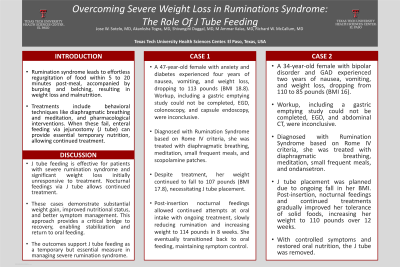Monday Poster Session
Category: Functional Bowel Disease
P2368 - Overcoming Severe Weight Loss in Rumination Syndrome: The Role of J Tube Feeding - A Case Series
Monday, October 28, 2024
10:30 AM - 4:00 PM ET
Location: Exhibit Hall E

Has Audio

Jose W. Sotelo, MD
Texas Tech University Health Sciences Center
El Paso, TX
Presenting Author(s)
Jose W. Sotelo, MD1, Akanksha Togra, MD1, Shivangini Duggal, MD2, M Ammar Kalas, MD1, Richard W. McCallum, MD3
1Texas Tech University Health Sciences Center, El Paso, TX; 2TTUHSC, El Paso, TX; 3Texas Tech University Health Sciences Center School of Medicine, El Paso, TX
Introduction: Rumination syndrome leads to effortless regurgitation of food within 5 to 20 minutes post-meal, accompanied by burping and belching, resulting in weight loss and malnutrition. Treatments include behavioral techniques like diaphragmatic breathing and meditation, and pharmacological interventions. When these fail, enteral feeding via jejunostomy (J tube) can provide essential temporary nutrition, allowing continued treatment.
Case Description/Methods: Case 1
A 47-year-old female with anxiety and diabetes experienced four years of nausea, vomiting, and weight loss, dropping to 113 pounds (BMI 18.8). Workup, including a gastric emptying study could not be completed, EGD, colonoscopy, and capsule endoscopy, were inconclusive. Diagnosed with Rumination Syndrome based on Rome IV criteria, she was treated with diaphragmatic breathing, meditation, small frequent meals, and scopolamine patches. Despite treatment, her weight continued to fall to 107 pounds (BMI 17.8), necessitating J tube placement. Post-insertion nocturnal feedings allowed continued attempts at oral intake with ongoing treatment, slowly reducing rumination and increasing weight to 114 pounds in 8 weeks. She eventually transitioned back to oral feeding, maintaining symptom control.
Case 2
A 34-year-old female with bipolar disorder and GAD experienced two years of nausea, vomiting, and weight loss, dropping from 110 to 85 pounds (BMI 16). Workup, including a gastric emptying study could not be completed, EGD, and abdominal CT, were inconclusive. Diagnosed with Rumination Syndrome based on Rome IV criteria, she was treated with diaphragmatic breathing, meditation, small frequent meals, and ondansetron. J tube placement was planned due to ongoing fall in her BMI. Post-insertion, nocturnal feedings and continued treatments gradually improved her tolerance of solid foods, increasing her weight to 110 pounds over 12 weeks. With controlled symptoms and restored oral nutrition, the J tube was removed.
Discussion: J tube feeding is effective for patients with severe rumination syndrome and significant weight loss initially unresponsive to treatment. Nocturnal feedings via J tube allows continued treatment. These cases demonstrate substantial weight gain, improved nutritional status, and better symptom management. This approach provides a critical bridge to recovery, enabling stabilization and return to oral feeding. The outcomes support J tube feeding as a temporary but essential measure in managing severe rumination syndrome.
Disclosures:
Jose W. Sotelo, MD1, Akanksha Togra, MD1, Shivangini Duggal, MD2, M Ammar Kalas, MD1, Richard W. McCallum, MD3. P2368 - Overcoming Severe Weight Loss in Rumination Syndrome: The Role of J Tube Feeding - A Case Series, ACG 2024 Annual Scientific Meeting Abstracts. Philadelphia, PA: American College of Gastroenterology.
1Texas Tech University Health Sciences Center, El Paso, TX; 2TTUHSC, El Paso, TX; 3Texas Tech University Health Sciences Center School of Medicine, El Paso, TX
Introduction: Rumination syndrome leads to effortless regurgitation of food within 5 to 20 minutes post-meal, accompanied by burping and belching, resulting in weight loss and malnutrition. Treatments include behavioral techniques like diaphragmatic breathing and meditation, and pharmacological interventions. When these fail, enteral feeding via jejunostomy (J tube) can provide essential temporary nutrition, allowing continued treatment.
Case Description/Methods: Case 1
A 47-year-old female with anxiety and diabetes experienced four years of nausea, vomiting, and weight loss, dropping to 113 pounds (BMI 18.8). Workup, including a gastric emptying study could not be completed, EGD, colonoscopy, and capsule endoscopy, were inconclusive. Diagnosed with Rumination Syndrome based on Rome IV criteria, she was treated with diaphragmatic breathing, meditation, small frequent meals, and scopolamine patches. Despite treatment, her weight continued to fall to 107 pounds (BMI 17.8), necessitating J tube placement. Post-insertion nocturnal feedings allowed continued attempts at oral intake with ongoing treatment, slowly reducing rumination and increasing weight to 114 pounds in 8 weeks. She eventually transitioned back to oral feeding, maintaining symptom control.
Case 2
A 34-year-old female with bipolar disorder and GAD experienced two years of nausea, vomiting, and weight loss, dropping from 110 to 85 pounds (BMI 16). Workup, including a gastric emptying study could not be completed, EGD, and abdominal CT, were inconclusive. Diagnosed with Rumination Syndrome based on Rome IV criteria, she was treated with diaphragmatic breathing, meditation, small frequent meals, and ondansetron. J tube placement was planned due to ongoing fall in her BMI. Post-insertion, nocturnal feedings and continued treatments gradually improved her tolerance of solid foods, increasing her weight to 110 pounds over 12 weeks. With controlled symptoms and restored oral nutrition, the J tube was removed.
Discussion: J tube feeding is effective for patients with severe rumination syndrome and significant weight loss initially unresponsive to treatment. Nocturnal feedings via J tube allows continued treatment. These cases demonstrate substantial weight gain, improved nutritional status, and better symptom management. This approach provides a critical bridge to recovery, enabling stabilization and return to oral feeding. The outcomes support J tube feeding as a temporary but essential measure in managing severe rumination syndrome.
Disclosures:
Jose Sotelo indicated no relevant financial relationships.
Akanksha Togra: Clinexel Inc – Owner/Ownership Interest. Clinexel Life Sciences Pvt Ltd – Owner/Ownership Interest. Cytenet Life science LLP – Owner/Ownership Interest. GLRK Healthcare foundation (Non-profit Organization Company) – Owner/Ownership Interest.
Shivangini Duggal indicated no relevant financial relationships.
M Ammar Kalas indicated no relevant financial relationships.
Richard McCallum: Evoke Pharma – Consultant.
Jose W. Sotelo, MD1, Akanksha Togra, MD1, Shivangini Duggal, MD2, M Ammar Kalas, MD1, Richard W. McCallum, MD3. P2368 - Overcoming Severe Weight Loss in Rumination Syndrome: The Role of J Tube Feeding - A Case Series, ACG 2024 Annual Scientific Meeting Abstracts. Philadelphia, PA: American College of Gastroenterology.
